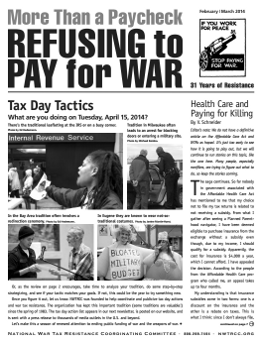There’s a new issue of NWTRCC’s newsletter out. Contents include:

- V. Schneider’s take on the ramifications of the Affordable Care Act for war tax resisters. I’ve shared some of my experiences with the Act’s provisions as a low-income, return-filing resister here at The Picket Line. Ms. Schneider writes about the challenges of the Act from the perspective of a resister who does not file returns, and therefore has no clear way of proving that she qualifies for the Act’s insurance subsidies. Schneider has some helpful recommendations for non-filling resisters who cannot afford non-subsidised insurance.
- Some notes on the new federal standard deduction and personal exemption amounts for the upcoming tax year, on the new IRS program that allows you to download some of the files the agency keeps on you, on a new website that keeps track of the legal aspects of alternative currencies, and on the troubles of the increasingly overwhelmed and under-budgeted IRS.
- Jason Rawn’s review of 99 Tactics of Successful Tax Resistance Campaigns, which begins: “As you may have just been thinking, three bags of cobras, homespun cloth, home-brewed beer, and transvestite Welshmen are all things that relate directly to tax resistance…”
- Some war tax resistance news, including a report of a Martin Luther King Jr. Day war tax resistance display at a recent anti nuclear weapons protest, a mention of some recent honors given to war tax resisters Robin Harper and Joanne Sheehan, and a brief note on the conviction and jailing of Quaker war tax resister Joseph Olejak.
- You can find more about the Olejak case in this recent article from the Times-Union. Olejak is spending several consecutive weekends in prison, and has agreed (in a plea bargain) to partially and incrementally pay the $242,684 the IRS says he owes since he stopped paying in .
- Some news about NWTRCC itself:
- The group is looking for people who want to serve on its Administrative Committee.
- The War Tax Resisters Penalty Fund — which helps to reimburse any penalties and interest seized from a war tax resister by the government — is now under new management.
- The next NWTRCC national gathering is scheduled for and will be held in San Diego, California.
- Robin Harper reflects on the development of “redirection” as a war tax resistance tactic: “I think it is fair to say that the essence and origins of the very widespread practice today of WTRs conscientiously redirecting their refused taxes into channels of constructive activism, community building, and addressing human needs, can be traced to [his own case in] .”



